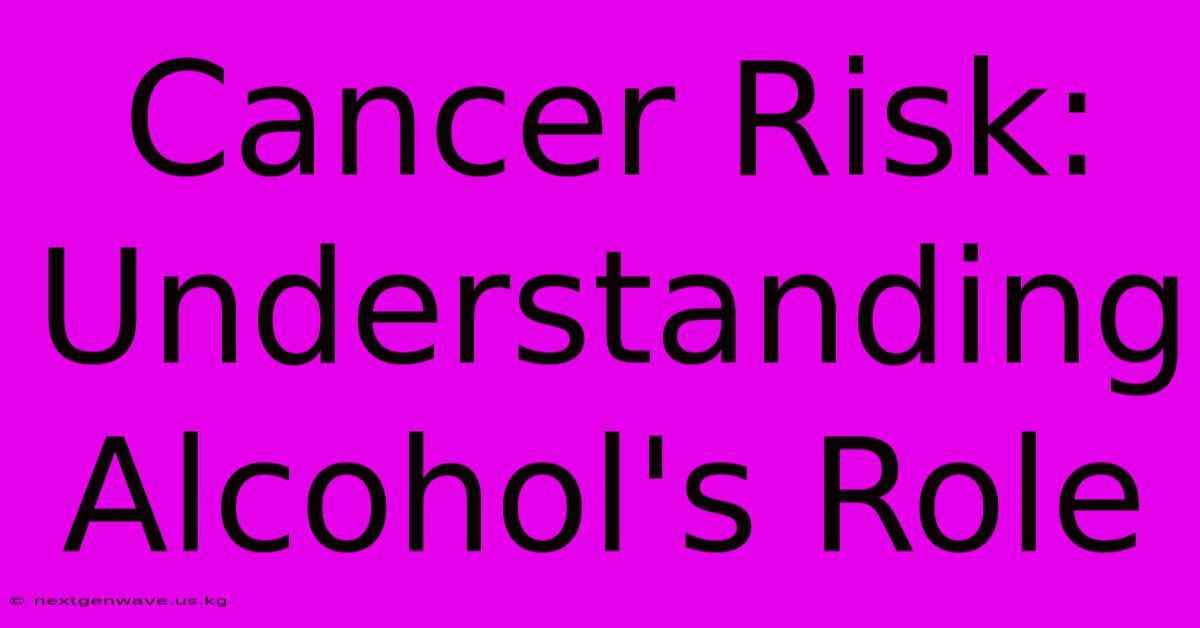Cancer Risk: Understanding Alcohol's Role

Discover more detailed and exciting information on our website. Click the link below to start your adventure: Visit Best Website nextgenwave.us.kg. Don't miss out!
Table of Contents
Cancer Risk: Understanding Alcohol's Role
Alcohol consumption is a significant risk factor for several types of cancer. While moderate drinking is often touted as having some health benefits, the evidence overwhelmingly demonstrates a strong link between alcohol and an increased risk of developing various cancers. Understanding this relationship is crucial for making informed decisions about alcohol consumption and protecting your health.
The Link Between Alcohol and Cancer: How Does It Work?
The connection between alcohol and cancer isn't a simple one; it's a complex interplay of factors. When alcohol is metabolized by the body, it produces acetaldehyde, a known carcinogen (cancer-causing substance). This toxic chemical damages DNA, interfering with the body's natural repair mechanisms and increasing the risk of mutations that can lead to cancer.
Acetaldehyde's Carcinogenic Effects
Acetaldehyde's damaging effects are multifaceted:
- DNA Damage: It directly alters DNA structure, leading to mutations that can initiate cancer development.
- Cell Cycle Disruption: It interferes with the normal cell cycle, promoting uncontrolled cell growth and division – a hallmark of cancer.
- Inflammation: It triggers chronic inflammation, a process linked to the development of numerous cancers.
Beyond acetaldehyde, alcohol consumption contributes to cancer risk in several other ways:
- Nutrient Deficiencies: Heavy alcohol use can interfere with the absorption of essential nutrients, weakening the body's defenses against cancer.
- Impaired Immune Function: Alcohol suppresses the immune system, making the body less capable of identifying and eliminating cancerous cells.
- Hormonal Imbalances: Alcohol can disrupt hormone levels, particularly estrogen, which plays a significant role in several hormone-related cancers.
Which Cancers Are Linked to Alcohol Consumption?
Alcohol is associated with an increased risk of several types of cancer, including:
1. Mouth, Throat, and Laryngeal Cancers:
These cancers of the head and neck region are strongly linked to alcohol consumption. The constant exposure of the mucous membranes in these areas to alcohol increases the risk of cellular damage and cancer development. Smoking significantly exacerbates this risk.
2. Esophageal Cancer:
Alcohol is a major risk factor for esophageal cancer, which affects the esophagus, the tube connecting the mouth to the stomach. The chronic irritation caused by alcohol contributes to the development of this cancer.
3. Liver Cancer:
Heavy alcohol consumption is a leading cause of liver cirrhosis and liver cancer. The liver's role in metabolizing alcohol makes it particularly vulnerable to the damaging effects of excessive alcohol intake. Long-term alcohol abuse significantly increases the risk of hepatocellular carcinoma (HCC), the most common type of liver cancer.
4. Breast Cancer:
While less directly linked than some other cancers, alcohol consumption is associated with an increased risk of breast cancer, especially in women. The mechanisms aren't fully understood, but it's believed to involve hormonal changes and increased estrogen levels.
5. Colorectal Cancer:
Studies have shown a correlation between alcohol consumption and an increased risk of colorectal cancer. The exact mechanisms are still under investigation, but it's likely related to the damage caused by acetaldehyde and other alcohol metabolites.
6. Other Cancers:
Alcohol has been linked to a higher risk of other cancers, including pancreatic cancer and stomach cancer. More research is ongoing to fully understand the extent of these associations.
Reducing Your Cancer Risk: Limiting Alcohol Intake
The good news is that you can significantly reduce your cancer risk by limiting or abstaining from alcohol. The more alcohol you drink, the greater your risk. Even moderate drinking increases the risk compared to no alcohol consumption at all.
Recommendations for Reducing Alcohol-Related Cancer Risk:
- Limit Your Intake: Adhere to recommended guidelines for alcohol consumption. These vary by region, but generally suggest limiting drinks to no more than one or two per day for men and one for women.
- Consider Abstinence: The safest approach is to avoid alcohol altogether. Abstaining significantly lowers your risk of developing alcohol-related cancers.
- Combine With Healthy Lifestyle Choices: A healthy lifestyle, including a balanced diet, regular exercise, and maintaining a healthy weight, can further reduce your cancer risk.
Seeking Professional Help for Alcohol Dependence
If you're struggling with alcohol dependence, it's essential to seek professional help. Alcohol addiction can significantly increase your risk of various cancers and other health problems. Treatment options are available, and getting help is a crucial step toward improving your health and well-being. Many resources offer support and guidance for those seeking to reduce or eliminate alcohol consumption.
Conclusion: Informed Choices for a Healthier Future
The evidence linking alcohol consumption to cancer is undeniable. By understanding the mechanisms of this relationship and making informed choices about your alcohol intake, you can significantly reduce your risk of developing several types of cancer. Limiting or avoiding alcohol, combined with a healthy lifestyle, represents a powerful strategy for protecting your health and future. Remember to consult with your doctor or a healthcare professional for personalized advice and guidance on alcohol consumption and cancer prevention. Your health is a valuable investment, and informed decisions are crucial for a long and healthy life.

Thank you for visiting our website wich cover about Cancer Risk: Understanding Alcohol's Role. We hope the information provided has been useful to you. Feel free to contact us if you have any questions or need further assistance. See you next time and dont miss to bookmark.
Also read the following articles
| Article Title | Date |
|---|---|
| Zachery Bryan Domestic Violence Charge | Jan 06, 2025 |
| Post Game Analysis Virginia Tech Football | Jan 06, 2025 |
| Tune In Hokies Vs Golden Gophers | Jan 06, 2025 |
| Alcohol Labels Cancer Warning Urged | Jan 06, 2025 |
| New Advisory Sugar And Child Health | Jan 06, 2025 |
